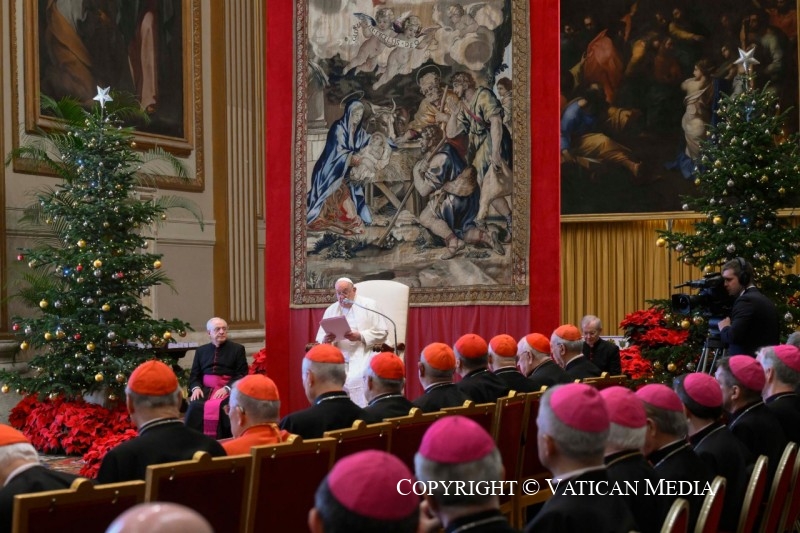Pope: More bombs on children in Gaza, ‘This is cruelty. This is not war’
In his greetings to the Roman Curia, the pontiff spoke again about what is happening in Gaza, where Patriarch Pizzaballa was prevented from making a Christmas visit. For Christmas Francis urges the members of the Curia to nurture humility and speak well and not ill of others, like God who does not bless “from above, but in the flesh.”
Vatican City (AsiaNews) – In his traditional address to the cardinals, bishops, priests and lay people of the Roman Curia for the exchange of Christmas Greetings, Pope Francis spoke out again against what is happening in Gaza.
“Yesterday they did not let the Patriarch of Jerusalem enter Gaza, they did not allow him. Yesterday, children were bombed. Children. This is cruelty. This is not war. I want to say it because it touches the heart.”
Even before reading his prepared text, citing what Card Giovanni Battista Re, Dean of the Sacred College, said about the war in his greetings, Francis gave an account of what happened yesterday in the Palestinian territory, where Card Pierbattista Pizzaballa was unable to visit the Latin parish of the Holy Family.
Despite talk about a ceasefire agreement, Israeli strikes have been relentless for 14 months and sowed death again yesterday. But Gaza is not only war, killings and rubble. It is a city with ancient roots, for Christians the cradle of a very rich monastic tradition.
Pointedly, Francis took his inspiration from one of its most illustrious voices – Dorotheus of Gaza, a monk who lived in the 6th century – to speak to the Roman Curia this Christmas, focusing on the Gospel exhortation “bless and not to curse”.
"Speaking well of others and not ill is something that concerns us all," the pontiff explained. Dorotheus himself suggested "the humility of accusing oneself" to learn not to speak ill of one's neighbour.
"Self-accusation,” the pontiff noted, “is the basis for our being able to say ‘no’ to individualism and ‘yes’ to the ecclesial spirit of community. Those who exercise the virtue of accusing themselves are gradually liberated from suspicion and leave room for God's action."
It is precisely this that gives birth to a community. “When one sees a defect in a person, one can only talk to three people: with God, with the person concerned, and if one cannot talk to the person, with the one in the community who can take care of the case. Nothing more.”
For Francis, the humility of those who know how to accuse themselves “is not a moral fact, but a theological one.” It is to make one's own the style of God who "has blessed us not with a decree handed down from above, but in the flesh.”
“Faced with the tragedy of humanity, what does God do? Does he stand up from above in his righteousness? No: God is God, his thoughts are not ours. He makes himself small in the womb of an invisible woman.”
“I like to think of the Roman Curia as a large workshop where there are many different tasks but everyone works for the same purpose: to bless, to infuse the world with the blessing of God and Mother Church."
Francis mentioned the work of the minutanti, those priests who prepare the texts of the responses sent in the name of the pontiff to many people who write to him asking for support on the journey of their lives, in moments of happiness as well as suffering.
He calls them the "artisans of blessing". Yet, he urged them too to be consistent. “We cannot write blessings and then speak ill of our brother," he said, warning people against "gossip."
Francis ended his address with a wish: "May the Lord help us to be always women and men of blessing."
22/12/2022 17:36
23/12/2021 18:57







.png)










